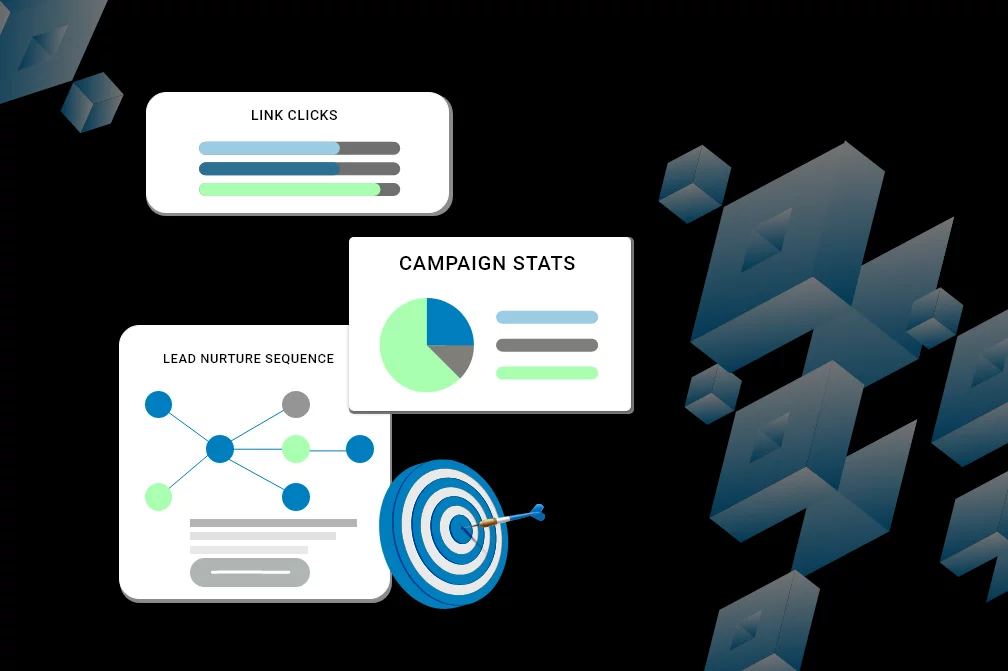How to Use Marketing Automation for Lead Generation

- By Sakshi Arora,
Published on: Jul 28, 2023 - Updated on: Jul 28, 2023
Table of Contents
In the fast-paced world of digital marketing, lead generation remains a top priority for businesses seeking to grow their customer base and boost revenue. Technological advancements have made marketing automation a powerful tool to streamline lead generation processes, nurture prospects, and convert them into loyal customers.
Let us explore how businesses can integrate it into their lead-generation strategies for optimum results.
Understanding the Lead Generation Process
Before delving into marketing automation, it is crucial to grasp the lead generation process. Lead generation involves attracting potential customers, known as leads, and capturing their interest in products or services. This process often includes various marketing strategies such as content marketing, social media engagement, email campaigns, etc.
The Powerful Impact of Marketing Automation on Lead Generation
- Businesses using marketing automation see a 14.5% increase in sales productivity and a 12.2% reduction in marketing costs. (Marketo)
- Companies with marketing automation experience a 451% increase in qualified leads. (Nucleus Research)
- 67% of marketing leaders already use marketing automation, with 21% planning to implement it soon. (Salesforce)
- Targeted lead nurturing results in a 20% increase in sales opportunities. (DemandGen Report)
- B2B marketers using marketing automation experience a 10% increase in their sales pipeline contribution. (Forrester)
- Marketing automation users achieve a 53% higher conversion rate from a lead to a marketing-qualified lead. (Aberdeen Group)
Integrating Marketing Automation into Lead Generation
Marketing automation technology has revolutionised the way businesses approach lead generation. By automating repetitive tasks and leveraging data-driven insights, it expedites the lead nurturing process, resulting in higher conversion rates and increased ROI.
Here's how you can effectively integrate marketing automation into your lead generation efforts:
- Segmentation and Personalisation: Utilise marketing automation features to segment your audience based on demographics, behavior, and preferences. Tailor your marketing messages to deliver personalised content, ensuring a more engaging and relevant experience for your prospects.
- Automated Lead Capture: Implement forms and landing pages with CRM (Customer Relationship Management) capabilities. Automatic lead capture ensures that every potential lead's information is captured accurately and promptly, minimising the risk of missed opportunities.
- Lead Nurturing Campaigns: Create automated lead nurturing campaigns that deliver targeted emails, educational content, and promotional offers to leads. This consistent engagement keeps prospects interested and moves them further down the sales funnel.
- Scoring and Qualification: Employ marketing automation expert techniques to score leads based on their interactions with your content and website. Lead scoring helps identify hot leads ready for direct sales engagement, improving conversion rates and sales efficiency.
- Automated Follow-ups: Set up automated follow-ups through personalised emails triggered by specific prospect actions, such as downloading an eBook or requesting a demo. Timely follow-ups ensure that leads stay engaged and receive the attention they need to convert.
- Analysing and Optimising: Leverage marketing automation's analytical capabilities to track the performance of your lead-generation campaigns. Use data insights to identify successful strategies and areas for improvement, enabling continuous optimisation for better results.
Numerous businesses across industries have reaped the benefits of marketing automation for lead generation. Brands have reported significant increases in lead conversions, shortened sales cycles, and improved customer retention. Marketing automation has enhanced efficiency and provided valuable data for informed decision-making.
Final Thoughts
Marketing automation is a game-changer for lead generation. Businesses can boost their lead conversion rates and drive sustainable growth by automating repetitive tasks, personalising communication, and nurturing prospects effectively. Embrace Digital technology to stay ahead in the competitive landscape, connect with your audience more meaningfully, and drive your business towards success.
Ready to supercharge your marketing efforts and boost ROI? Let’s talk! Growth Natives Australia is a leading marketing automation agency with a global footprint and a proven track record of providing result-oriented marketing automation solutions.
Experience the power of data-driven strategies and seamless automation to unlock your business' full potential. Learn more about our services by emailing us at info@growthnatives.com and schedule a personalised consultation.
FAQ's
What is marketing automation lead generation?
Marketing automation lead generation uses automated tools and software to identify, nurture, and convert potential customers (leads) into paying customers. It involves leveraging technology to streamline and optimize the lead generation process, making it more efficient and effective.
How do you automate the lead generation process?
To automate the lead generation process, you can follow these steps:
- Use lead capture forms on your website to collect visitor information.
- Implement email marketing automation to nurture leads with targeted content.
- Utilize CRM (Customer Relationship Management) software to track and manage leads.
- Employ lead scoring to prioritize and identify the most promising leads for sales.
Which are the four steps of the lead generation process?
The four steps of the lead generation process are:
- Attracting prospects: Drawing potential customers to your brand through various marketing channels like content, social media, and advertising.
- Converting visitors to leads: Engaging with interested prospects and capturing their contact information through forms or opt-ins.
- Nurturing leads: Building relationships with leads through personalized content and communication to move them closer to a purchasing decision.
- Converting leads to customers: Closing the sales cycle by guiding leads through the final stages and encouraging them to purchase.
What is the process of marketing automation?
The process of marketing automation involves the following key steps:
- Planning: Define your marketing objectives and map out the customer journey.
- Data collection: Gather relevant data about your prospects and customers.
- Segmentation: Group your audience based on shared characteristics or behaviors.
- Automation setup: Implement automated workflows using software to deliver targeted messages to each segment.
- Execution: Activate the automation, allowing it to send emails, messages, or trigger actions automatically.
- Monitoring and optimization: Continuously track performance, analyze results, and make improvements to enhance the effectiveness of the automation.
Author Box
Sakshi Arora
Sakshi Arora is a seasoned content writer and editor with extensive experience across various industries including B2C, B2B, travel, e-commerce, and IT. In her free time, she enjoys expressing her creative side through painting and writing poetry. She also finds solace in nature and has a deep spiritual connection. Music brings her immense joy.
Join Our Newsletter
Stay up to date with our latest blogs and news.
Top Related Articles
Let's Scale Your Brand Together !
Copyright © 2023 All Rights Reserved



